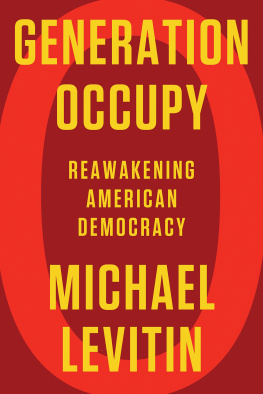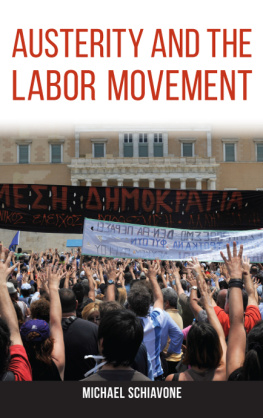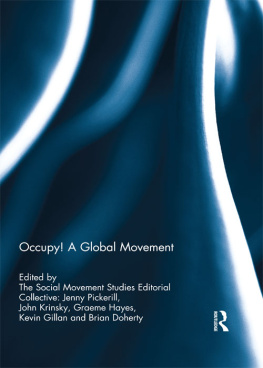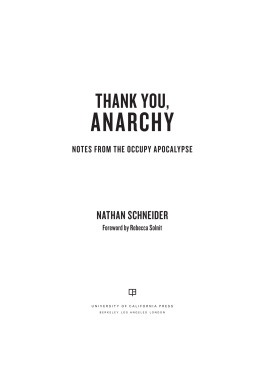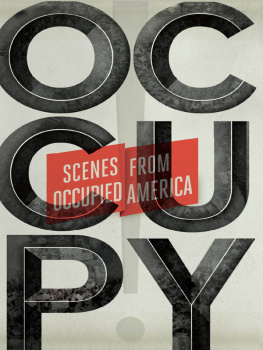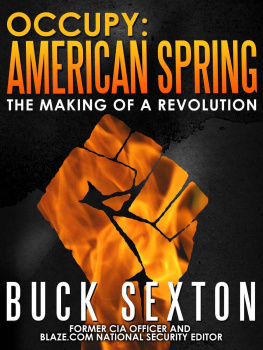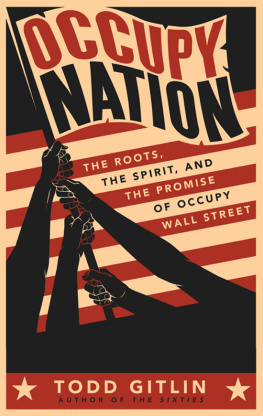Contents
Guide
Page List
For my parents
There is a mysterious cycle in human events. To some generations much is given. Of other generations much is expected. This generation of Americans has a rendezvous with destiny.
FRANKLIN DELANO ROOSEVELT in his acceptance speech at the
Democratic National Convention in Philadelphia, 1936
True peace is not merely the absence of tension; it is the presence of justice.
MARTIN LUTHER KING JR ., Stride Toward Freedom:
The Montgomery Story, 1958
CONTENTS
GENERATION OCCUPY
_________
A DECADE AFTER OCCUPY WALL STREET IGNITED A DISCUSSION about wealth inequality, corporate greed and the corrupting influence of money in politics, people still ask: What happened to Occupy? The movement that sprang to life in lower Manhattan on September 17, 2011the 224th anniversary of the signing of the U.S. Constitutionsparked occupations in a thousand towns and cities that seemed, for several months, to rewire Americas political DNA. Polls showed two-thirds of the country backed the ideas and principles of the movement, and for a brief autumn Occupy captured the global stage as its message resonated around the world.
Then, like a storm, it was over. Collapsed both from its own lack of structure and from the state violence that suppressed it, Occupy vanished almost as quickly as it had arrived. One thing most people remember is that Occupy introduced the vocabulary of the 99 percent and the 1 percent, putting the crisis of inequality on the map. But thats about it. The movement created no electoral organization, achieved no legislative success and made no real impact on American political life, or so the story line went. To date, no one has provided an accurate answer to the question, What happened to Occupy?
I would contend we are no longer the country we were before Occupy Wall Street revived the labor movement, remade the Democratic Party and reinvented activism, birthing a new culture of protest that put the fight for economic and social justice at the forefront of a generation. Far from a passing phenomenon, Occupy inaugurated an era of political change in which the demands of the majority continue to grow louder and more focused. It began with the kids. The kids came out and they didnt go home. They targeted Wall Street, the source of our dysfunctional democracy, and issued a singular demand that was all of the demands: Justice. Fairness. Equality. Their sloganWe are the 99 percentinspired hundreds of thousands to move away from their screens and into the streets and squares where the vision of Occupy replaced the unfulfilled promise of Obamas Hope and Change. They had no leaders. There was no plan. This was not a protest. It was a rebellion, a revolt whose time had come. The seeds they planted took root overnight and quickly spread and multiplied, germinating in the countrys consciousness. No one thought young people would remain camped out in parks forever. Nor did anyone expect the movement to reshape the political and cultural arenas in the ways that it did.
I DIDN T COME TO NEW YORK LOOKING FOR A REVOLUTION . I CAME to catch a flight leaving JFK for Berlin, where I had a wife waiting to divorce me. I believe in the adage that when one door closes, another one opens. It may not be the one you expect, but the trick is to walk through it anyway.
Perhaps I had been waiting for Occupywe had all, to some degree, been waiting for itand when it finally appeared, I felt I had no choice. It was right there in front of us, staring our generation in the eyes, daring us to act as no moment ever had, to put our convictions and our bodies on the line. We werent used to doing such things, our generation. You could call us the Obama Generation. The iPhone Generation works, too. We were the Anti-Globalization and the Millennial Generation, the Unaffordable Rent and College Debt Generation. We were also, of course, the September 11, Iraq War, Financial Crisis and Great Recession Generation.
We were the Occupy Generation. Generation Occupy.
As far back as I can recall I had been in search of our generation. I grew up in the 1990s, that formidably inactive decade when we inherited a million choices and a spirit of prosperous unworry despite the sinking ship we knew we were already on. Our generation? We had underachieved to the point that we were already like a forgotten, irrelevant chapter in the nations story, an in-between period of minimal consequence, pressed like an island between two continent-like centuries. Generations, like individuals, define themselves as much through their inaction as through their actions: not by what they do but by what they fail to even try to do. I had always felt so much more was expected of our generationat least the expectation that we would do something. Which is why, when our moment finally arrived, not a bone in me could turn away.
Like so many at Occupy, I came from a family of liberal Democrats. My grandparents on my fathers side were Russian Jews who fled Berlin in the 1930s and who understood firsthand the value of freedom and democracy. My mothers parents were Democratic Party organizers who helped launch the celebrated career of the senator from California, Alan Cranston. I grew up in the hippie hills of Sonoma County, an hour north of San Francisco, with a mother who reported on the United Farm Workers in the seventies and marched for nuclear disarmament in the eighties, and a beatnik writerhouse painter stepfather from Oklahoma who had resisted the Vietnam draft. Instilled in me was a belief that American government at its best played an active role helping to improve and secure society, from the New Deal under Franklin Delano Roosevelt to the Civil Rights era of Lyndon B. Johnson. I learned to trust in the virtues of a liberal, patient style of politics: the faith that for all our systems flaws and disappointments, the United States managed not only to bumble along and function but also, on occasion, to progress.
My first political memory was the November night in 1992 when Bill Clinton won the presidency and parties up and down our road carried on past dawn. The Reagan-Bush years were over, a baby boomer was in the White House and suddenly the 1960s were looking vindicated while the 1990s, our generation, were about to take off. Born in 1976, I came to adolescence in time to glimpse the Berlin Wall falling and Patriot missiles shooting across the Baghdad sky. By the time I reached college, the planetary crisis had descended upon us. In Vice President Al Gores 1992 book, Earth in the Balance, science already presented clear evidence of man-made global warming. While studying history at the University of California, Santa Cruz, I found my place in environmental activism. I helped organize a UC-wide boycott of Mitsubishiat the time, and incredibly still, one of the worlds largest destroyers of tropical rainforestand campaigned to stop Pacific Bell, the states telephone monopoly, from producing tens of millions of annual phone books from British Columbias ancient boreal forest. At one point I joined the radical outfit Earth First! and was arrested in Humboldt County with three hundred other protesters for blockading a road into the Headwaters Forest, the largest privately owned stand of old-growth redwood trees on Earth. The resistance in the nineties felt real, it felt serious, and for a moment, it seemed, our generation stood poised to shift the nations priorities and become masters of our future.

